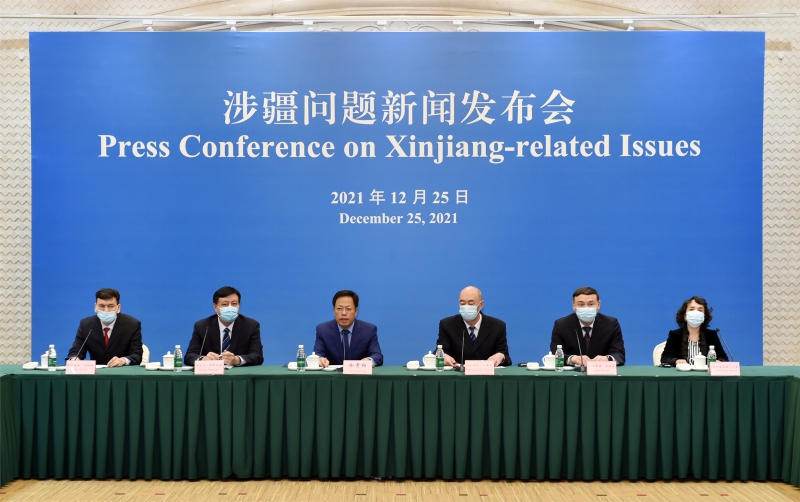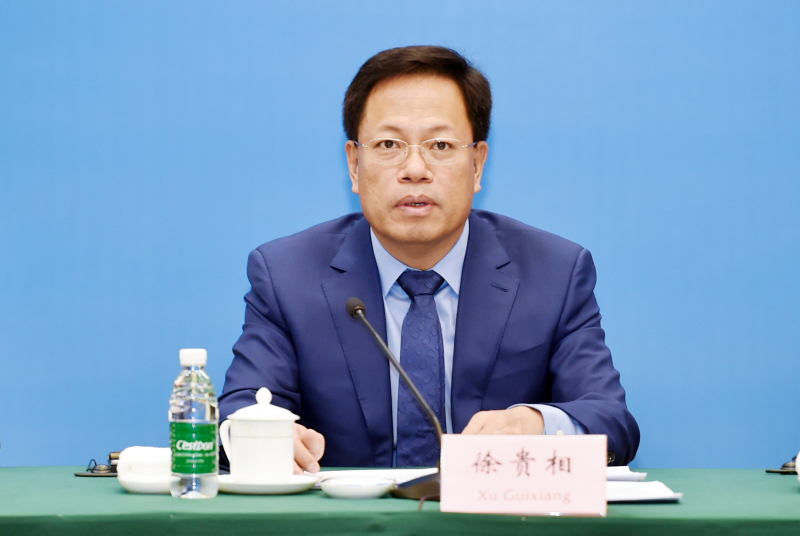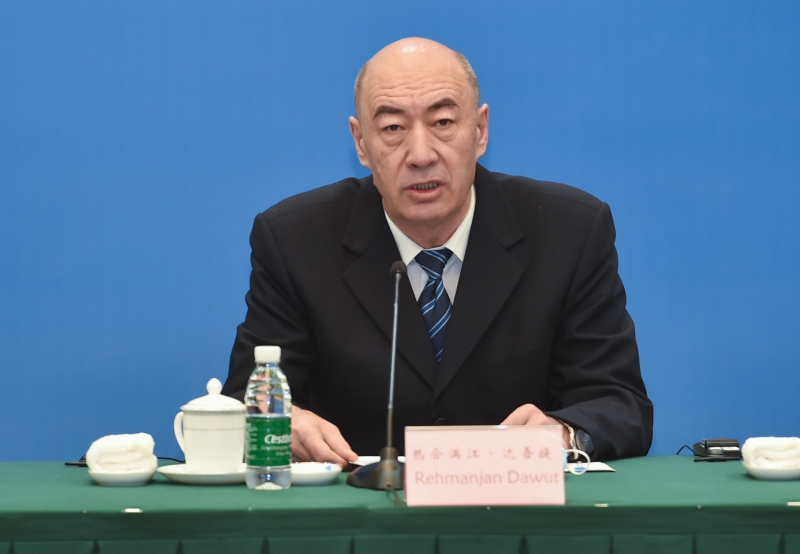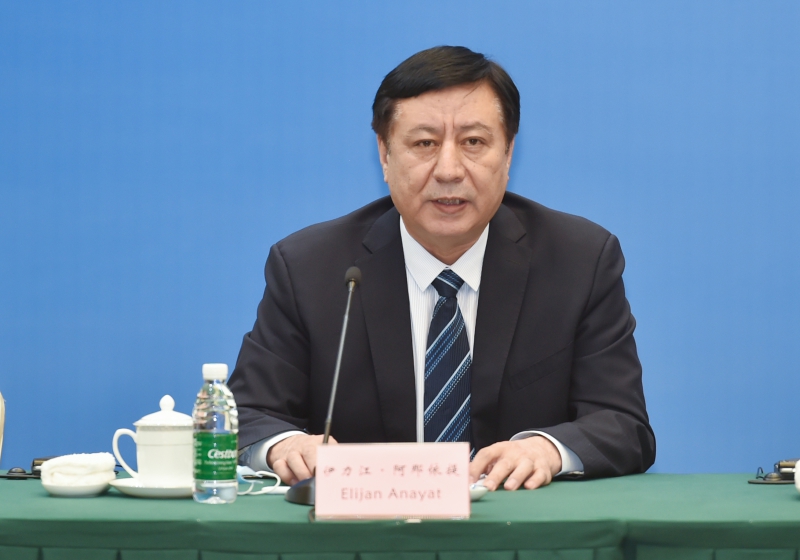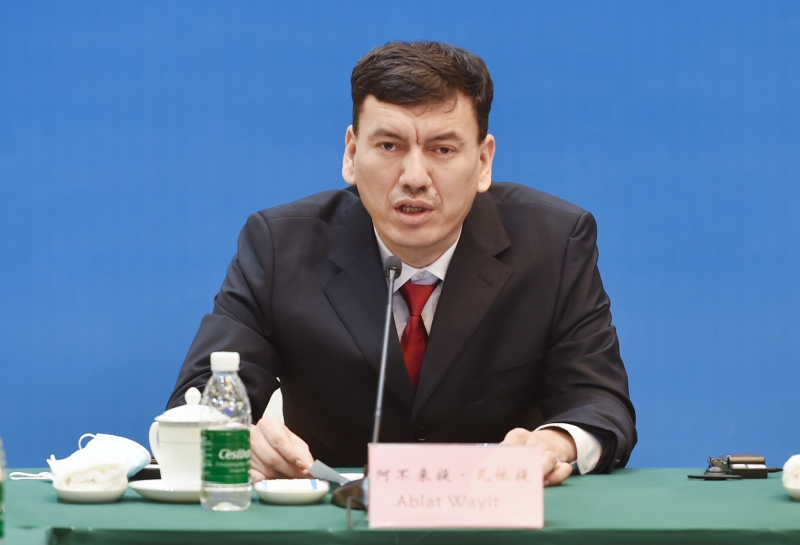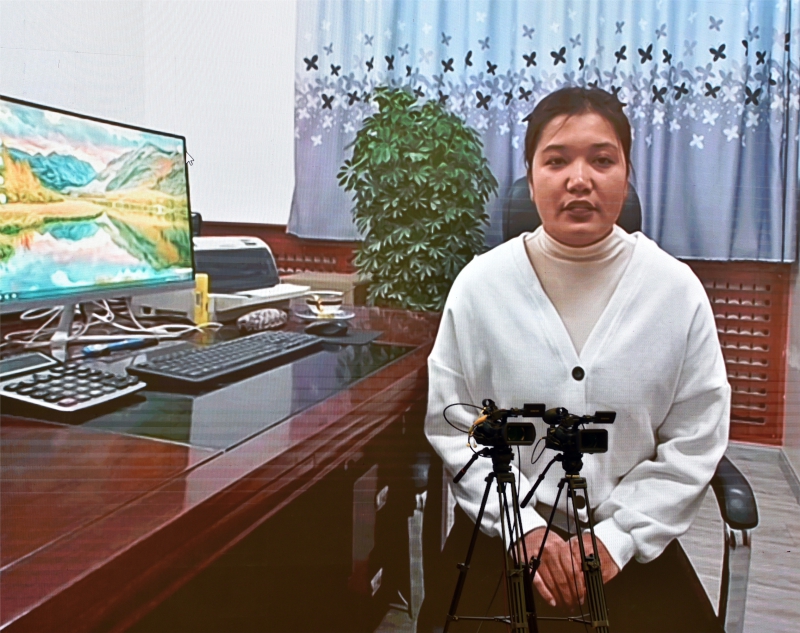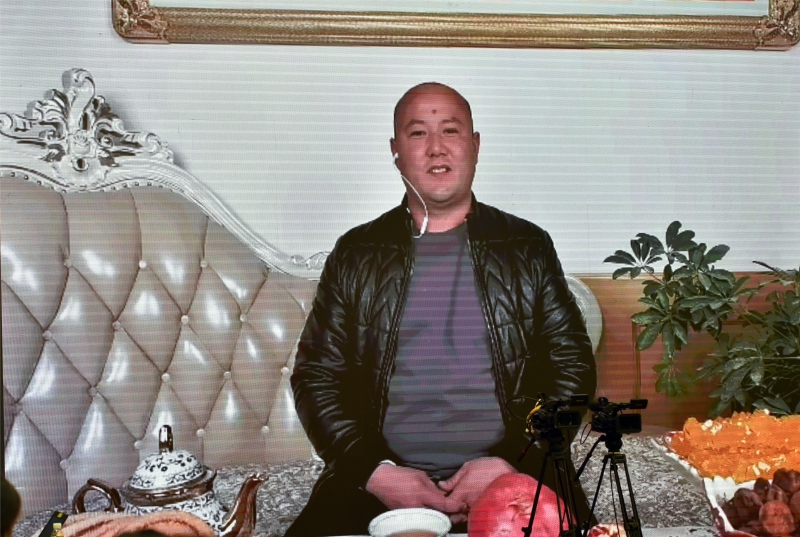| The 65th Press Conference on Xinjiang-related Issues by Xinjiang Uygur Autonomous Region |
| 2022-01-05 01:09 |
|
Photo taken on December 25, 2021 shows the 65th Press Conference on Xinjiang-related Issues by Xinjiang Uygur Autonomous Region in Beijing. Photo by Xinjiang Daily/ Zhou Peng On December 25, 2021, the 65th Press Conference on Xinjiang-related Issues by Xinjiang Uygur Autonomous Region was held in Beijing. The following is the memoir of the conference. Xu Guixiang: Good morning, dear fellow media reporters! Welcome to the press conference on Xinjiang-related issues by Xinjiang Uygur Autonomous Region. I’m Xu Guixiang, the spokesman of the People’s Government of Xinjiang Uygur Autonomous Region. Now, I’d like to introduce those who are joining us for today’s press conference. They are Elijan Anayat, spokesman of the People’s Government of Xinjiang Uygur Autonomous Region, Rahmanjan Dawut, director of the Department of Human Resources and Social Security of Xinjiang Uygur Autonomous Region, Ildos Murat, the vice chairman of Federation of Trade Unions in Xinjiang Uygur Autonomous Region, Mahpurat Kanji, professor of Xinjiang Normal University and Ablat Wayit, associate professor of Xinjiang Normal University. We’ve also invited two representatives of the general public to introduce related situations to us. Due to the influence of the pandemic, some media friends will join us through online connection in addition to these who are present. Photo taken on December 25, 2021 shows Xu Guixiang, spokesman of People’s Government of Xinjiang Uygur Autonomous Region speaks at the 65th Press Conference on Xinjiang-related Issues by XUAR in Beijing. Photo by Xinjiang Daily/ Zhou Peng First of all, I’d like to share my views on related issues. Recently, the United States openly gets involved in Xinjiang affairs and interferes with China’s internal affairs by insisting on signing the so-called “Uygur Forced Labor Prevention Act” in the vain hope of realizing its scheme of containing China through disrupting Xinjiang. It’s simply the manifestation of bullying, extension of bandit logic and revival of the Cold War mentality, which is a dangerous act that’s completely wrong and goes against people’s will. The so-called “Uygur Forced Labor Prevention Act” is a serious distortion of the real situation of labor and employment in Xinjiang. Xinjiang strictly implements the laws and regulations including the Constitution of the People’s Republic of China, Labor Law of the People’s Republic of China and Labor Contract Law of the People’s Republic of China. It formulates and implements laws and regulations including Measures for Implementing the National Employment Promotion Law and Regulations on Labor and Social Security Supervision. In so doing, the establishment,operation, supervision and mediation of labor relations are brought under the rule of law, regular labor enforcement inspections are carried out in depth, and forced labor by means of violence, threat or illegal restriction of personal freedom is strictly prohibited. Upholding the concept of enabling people to lead a good life, Xinjiang earnestly respects and protects the legitimate rights and interests of people of all ethnic groups, introduces a series of active employment policies, builds a series of employment platforms, and provides a large number of jobs so that people of all ethnic groups can create wealth through hard work and with their own hands and live a good life. During the process, Xinjiang resolutely opposes all forms of ethnic discrimination and strictly forbids all forms of forced labor to ensure that people of all ethnic groups work decently in the sun. Based on equality, voluntariness and consensus, workers of all ethnic groups in Xinjiang sign labor contracts with companies in accordance with the law and their rights of remuneration, rest and leave, labor safety and health protection, access to insurances and social benefits are protected by the law. Moreover, their rights in religious beliefs, ethnic culture, languages and scripts are respected and safeguarded. As the mindset and consciousness that labor changes life has been established among people of all ethnic groups, profound changes have taken place in their concept of labor. Their labor enthusiasm keeps bursting, their labor skills are greatly improved and a full flow of fruits of labor is seen. The so-called “Uygur Forced Labor Prevention Act” seriously violates international law and the fundamental guidelines of international relations. In the scope of international law, what is forced labor and who determines forced labor are clearly prescribed. According to the Convention of Forced Labor adopted by the ILO, forced labor refers to all work or service which is exacted from any person under the menace of any penalty and for which the said person has not offered himself voluntarily. In other words, three elements are necessary, namely “not voluntarily”, “menace of any penalty” and “work or service”. In light of this standard, there’s no so-called “forced labor” in Xinjiang at all. Seeing that it’s impossible to suppress Xinjiang by applying international law, the United States resorts to domestic law instead to make judgment on Xinjiang, which is a typical “long-arm jurisdiction”. Their devil’s claws stretch too long and go beyond the scope of the law to become a kind of political manipulation and a parody. How does the United States regard international law and the fundamental guidelines of international relations? Their conducts are so absurd! The so-called “Uygur Forced Labor Prevention Act” seriously tramples on the shared values of human society. “Labor creates wealth” is a basic rule of the development of human society. The right to labor is a basic human right. Any country shall safeguard its people’s basic labor rights and enable them to live a wonderful life. As Xinjiang is relatively backward in social economic development around China, it has an urgent task to make labor change life. The concept and practices of Xinjiang in promoting labor and employment fully comply with social justice and morality, the real situation of its social economic development and the strong aspiration of people of all ethnic groups in Xinjiang. There’s nothing to be accused! Since the end of 2018, the region has received visits by official delegation from the UN, permanent representative of the countries concerned in Geneva,foreign dignitaries, envoys from Africa, Latin America and the Caribbean and Arab States as well as heads of relevant international organizations in China, foreign religious organizations, media reporters, scholars and Internet influencers, including more than 2,100 people in 158 groups and from more than 100 countries. After they have seen the labor situations in the fields, at factories and workshops and in rural villages in Xinjiang with their own eyes, they have spoken highly of the regional labor policy and its effectiveness and have formed common recognition. However, based on false information, lies and rumors and affected by ideological bias, the United States points fingers at labor affairs in Xinjiang, which is unjust, not objective and very irresponsible. In our view, the so-called Xinjiang-related “bill” signed by the US won’t affect the historical development and progress of Xinjiang. It reveals instead the sinister intention of the United States’ true hegemony and sabotage under the disguise of fake human rights and concern. Workers of all ethnic groups have a say concerning the labor situations in Xinjiang and we don’t need the United States to worry about anything for us. The United States might as well mind its domestic forced labor problems and formulate a “Native American Forced Labor Prevention Act”. Why? The American history is tainted with expulsion, slaughter and forced assimilation of the Native Americans, who have become a “disappearing ethnicity”. We advise the US leaders to ask themselves questions and reflect deeply! Now we invite heads in charge of relevant functional departments of Xinjiang Uygur Autonomous Region, experts, scholars and some representatives of the general public to share their views with us. Xu Guixiang: Xinjiang has taken many effective measures to promote employment of all ethnic groups, ethnic minorities in south Xinjiang in particular. Now let’s give the floor to Rahmanjan Dawut, director of the Department of Human Resources and Social Security of Xinjiang Uygur Autonomous Region. Photo taken on December 25, 2021 shows Rahmanjan Dawut, director of the Department of Human Resources and Social Security of Xinjiang Uygur Autonomous Region speaks at the 65th Press Conference on Xinjiang-related Issues by XUAR in Beijing. Photo by Xinjiang Daily/ Zhou Peng Rahmanjan Dawut: Doing a good job in labor and employment is of great significance to protect the labor and employment rights of all ethnic groups, develop and improve people’s livelihood, and promote social harmony and stability. Since the 18th Congress of the Communist Party of China, Xinjiang has implemented with full force beneficial projects, kept enhancing employment training, actively widened employment channels and effectively enlarged employment capacity. As the employment tendency has been moving to the better, the income of people of all ethnic groups has kept increasing, their living standards have kept improving and their sense of gain, happiness and security has been strengthened remarkably. Firstly, workers’ initiative and motivation for employment are fully mobilized. The region focuses on the employment potential of workers of all ethnic groups, improves vocational skills and relies on their own efforts to find jobs and independent entrepreneurship to achieve stable employment. In recent years, people of all ethnic groups in Xinjiang, poor people in the rural areas of southern Xinjiang in particular, have a stronger will to go out of villages and work in the enterprises. The concept of startup, increasing income and getting better off is deeply rooted in people’s minds. For example, Bushala Ulamkader, a villager of Pishan County, Hotan Prefecture became an employee of a textile company in Hutubi County, Changji Hui Autonomous Prefecture after job application in 2018. The company signed labor contract with her and paid for her insurances. She has been in the company for more than three years and has become a skilled worker instead of a common employee. Her salary has also increased from RMB 2,500 to 4,000. Secondly, the fundamental role of human resources in promoting employment is fully developed. Workers are guided to flow properly and helped to get employed through supply and demand information of the market. The mutual choice of the supply and demand parties is achieved through the employer’s independent employment and the worker’s independent choice of employment.The supply and demand of labor is regulated through market information of wages and salaries. Now people of all ethnic groups who want to get employed flock to the human resources markets for appropriate jobs. The problem of “recruitment difficulties” of some enterprises has also been effectively solved. By now there have been more than 144 county level human resources markets, 149 regimental labor security institutions and 8,668 community level labor security stations across the region, providing various kinds of employment services for 2,172.84 times in total. Thirdly, the government’s important role in promoting employment is fully exercised and the employment priority strategy is implemented. Xinjiang vigorously develops labor-intensive industries with large employment capacity, small and medium-sized enterprises and modern service industries etc., continuously increases the number of jobs and expands the scale of urban and rural employment. Xinjiang implements a more active employment policy, adopts policy measures such as tax concessions, granting social insurance subsidies and guaranteed loans for business start-ups to encourage enterprises to absorb employment.It strengthens public employment services, standardizes human resources markets, and provides equal opportunities for workers to participate in employment and business start-ups. It focuses on targeted skills training for the surplus rural labor force, the unemployed, the disabled and other groups to effectively enhance their abilities for independent employment. For example, from January to September 2021, 2,584 labor-intensive industrial projects were implemented across the region, introducing RMB 167.835 billion in place and making it easier for and supporting people of all ethnic groups to work nearby in the local areas. Xu Guixiang: Now let’s watch a video about ethnic minorities people in Xinjiang who work nearby in the local areas. Xu Guixiang: The trade union is an important organization that protects workers’ rights and benefits. Various levels and kinds of trade unions in Xinjiang have played an important role in protecting the legal rights and benefits of workers of all ethnic groups. Now let’s give the floor to Ildos Murat, the vice chairman of Federation of Trade Unions in Xinjiang Uygur Autonomous Region. Photo taken on December 25, 2021 shows Ildos Murat, the vice chairman of Federation of Trade Unions in Xinjiang Uygur Autonomous Region speaks at the 65th Press Conference on Xinjiang-related Issues by XUAR in Beijing. Photo by Xinjiang Daily/ Zhou Peng Ildos Murat: Various levels and kinds of trade unions in Xinjiang are people’s organizations that protect the legal rights and benefits of workers of all ethnic groups on behalf of them. We always uphold the basic responsibility of conscientiously fulfilling the lawful rights and interests of workers and serving them wholeheartedly, and work on issues directly related to workers’ interests such as labor remuneration, economic compensation, pension recovery, claims of work injury, medical and unemployment insurance, as well as protection of workers’ welfare and benefits, and strive to build harmonious labor relations.To date, there have been 32,500 community level trade union organizations, covering 91,500 enterprises and including 4.3667 million people. Over 95% enterprises with over one hundred employees have established their trade unions. In recent years, our trade union organizations have taken the initiative to participate in legislation to protect the rights and interests of workers at the source in accordance with the law. Applying the labor law and other laws and regulations as guidelines, the region has issued seven local regulations, including the Regulation on Collective Wage Negotiation and the Regulation on the Protection of Workers’ Labor Rights and Interests. These regional regulations are applicable to workers of all ethnic groups and in various kinds of companies under the regional administration and have made regulations to protect the labor, economic, democratic and political rights of workers of all ethnic groups. We’ve established nearly 100 workers’ legal service stations across the region to provide services such as free legal advice and legal assistance to workers of all ethnic groups. Volunteer lawyers groups made up of 1,000 lawyers are set up jointly with the Department of Justice of the region and Xinjiang Lawyers’ Association and have been to more than 3,000 enterprises in Xinjiang. They walk into the front-line workshops of grass-roots enterprises,hold legal publicity activities such as “sending laws into enterprises” with workers at zero distance, guide them to sign labor contracts with relevant enterprises in accordance with the principle of equality and voluntariness and obtain corresponding remuneration, including enjoying complete freedom in choosing places to work. More than 10,000 activities including “Compliance with the Law, Building Dreams Together” public legal service for migrant workers have been held to provide workers of all ethnic groups with legal services in terms of their rights to labor remuneration, rest and leave, labor safety and health protection, and social insurance and benefits. In recent years, we’ve provided workers of all ethnic groups with services earnestly. Workers’ legitimate rights and benefits are actively protected by mean of collective consensus and democratic management of the workers’ congress. For example, consultations are conducted on shortening working hours, shift rotation, job stabilization and wage adjustment, so that wherever the legitimate rights and interests of workers are infringed, the union will stand up and speak out. Great efforts are made to relieve urban workers with difficulties of their burdens, enhance the efforts to help and rescue and provide the majority of workers with universal, permanent and accurate services characteristic of trade unions.In so doing, 84,000 workers with difficulties are free from difficulties. 1,936 trade unions are set up actively for 8 groups including truck drivers, delivery men, nursing care workers, domestic helpers, shopping mall information workers, online food delivery workers, real estate agents, and security guards with a membership of 148,100 workers, protecting effectively their labor rights. Skill promotion activities are held extensively and RMB 30 million award fund is established to encourage workers of all ethnic groups to uphold their own qualities and skills and choose their occupations based on their own will. Xu Guixiang: That the rights and benefits of workers of all ethnic groups in Xinjiang are fully protected can’t be denied by the signing of the so-called US “bill”. Now let’s give the floor to Elijan Anayat, spokesman of the People’s Government of Xinjiang Uygur Autonomous Region. Photo taken on December 25, 2021 shows Elijan Anayat, spokesman of the People’s Government of Xinjiang Uygur Autonomous Region speaks at the 65th Press Conference on Xinjiang-related Issues by XUAR in Beijing. Photo by Xinjiang Daily/ Zhou Peng Elijan Anayat:Workers of all ethnic groups in Xinjiang get employed based on voluntariness and choose their occupations freely and the rights and benefits of all ethnic groups are protected by the law, including the Chinese Constitution, Labor Law, Labor Contract Law, Criminal Law, Law of the People’s Republic of China on Administrative Penalties for Public Security, Employment Promotion Law, and Social Insurance Law,etc..In light of the definition from the International Convention, the laws and regulations of our country, or the objective reality, there’s no so-called “forced labor” at all in Xinjiang. Firstly, the right of equal employment of people of all ethnic groups in Xinjiang is protected by the law. Guaranteeing equal employment rights is not only pivotal to people’s livelihood but also an important manifestation of maintaining human dignity and enabling people to lead a happy life.National laws including the Constitution, Labor Law, Labor Contract Law, Employment Promotion Law, Social Insurance Law, Law on the Protection of Women’s Rights and Interests and Law on the Protection of Persons with Disabilities are important legal guidelines of guaranteeing equal employment. Besides, regional laws and regulations are formulated and implemented to provide solid legal guarantees to workers of all ethnic groups, including Measures for Implementing the National Employment Promotion Law, Regulations on Labor and Social Security Supervision, Regulations of the Xinjiang Uygur Autonomous Region on the Protection of Labor Rights and Interests,Regulations of the Xinjiang Uygur Autonomous Region on the Protection of Women’s Rights and Interests, Regulations of the Xinjiang Uygur Autonomous Region on the Protection of Persons with Disabilities. They ensure that citizens are entitled to the rights of equal employment and are not restricted or discriminated because of ethnicity, race, gender, age, culture, religious belief or economic competence. Secondly, workers of all ethnic groups in Xinjiang choose to work voluntarily and choose their occupations by themselves and their freedom is protected by the law. That workers have the right to choose their occupations is a legal manifestation of their independent personality and free will. Related prescriptions of the Constitution of the People’s Republic of China, the Labor Law of the People’s Republic of China, the Labor Contract Law of the People’s Republic of China and Law of the People’s Republic of China on Administration and Penalties of Public Security prohibit forced labor by means of violence, threat or illegal restrictions of physical freedom, and conducts of insults, physical punishment, beatings, illegal searches and detention of workers, etc.. Administrative penalties in accordance with the law are exercised for violations to the law; criminal responsibilities in accordance with the law are exercised for crimes. People of all ethnic groups are completely free to get employed and they have the right to choose their occupations freely and decide what to do, where to work and which enterprise to work at by themselves. Workers of all ethnic groups sign labor contracts and establish labor relations with the employers in accordance with the law and their physical freedom is protected by the law. Thirdly, the rights to rest and leave of workers of all ethnic groups in Xinjiang are protected by the law. The right to rest and leave is an important part of human rights, one of the basic rights of citizens prescribed in the Constitution and is a category of human rights that shows the independent personality of the worker and embodies his or her rights and benefits. A working hours system in which employees work 8 hours a day and 40 hours a week is observed in Xinjiang in accordance with the relevant national laws and regulations.Employers who need to extend working hours due to production and operation must consult with trade unions and workers in accordance with the law, and arrange for compensatory time off or pay the corresponding compensation. In the meantime, workers are guaranteed the right to rest on legal holidays and rest days, such as the Spring Festival, the Roza Festival and Corabn Festival in accordance with the law. Fourthly, the right of workers of all ethnic groups in Xinjiang to receive labor remuneration is protected by the law. The labor remuneration right is the core of labor rights and is a fundamental human right, which is both a basic livelihood guarantee for workers and their families and a recognition and evaluation of their labor by the society. The labor remuneration right is one of the core labor standards recognized by the International Labor Organization, and is also the object of key protection in China’s Constitution, Labor Law,Labor Contract Law and Criminal Law.In Xinjiang, workers of all ethnic groups receive remuneration after work in accordance with the prescriptions of related national laws and employers shall pay the workers remuneration in full and on time. If the employer violates these due obligations, workers have the right to report complaints to the relevant departments in accordance with the law. Human resources and social security administrative departments at all levels and public security organs strengthen the construction of administrative law enforcement and criminal justice convergence mechanism, enhance the combat against the crime of refusal to pay labor remuneration, to ensure that workers receive their wages in full and on time, and effectively safeguard the legitimate rights and interests of workers of all ethnic groups. Fifthly, the customs and practices, religious beliefs, and languages and scripts of workers of all ethnic groups are protected by the law.Xinjiang strictly implements laws and regulations including the Constitution of People’s Republic of China, Law of the People’s Republic of China on Regional Ethnic Autonomy, Law of the People's Republic of China on the Standard Spoken and Written Chinese Language,and Regulations on Religious Affairs. It fully respects and guarantees the right of freedom of religious beliefs of workers of all ethnic groups and no organization or individual shall interfere with it. When promoting the application of the standard spoken and written Chinese language, we fully respect and guarantee the right of ethnic minority workers to use their own language and script, and workers can independently choose which language and script to use for communication. The customs and habits of workers of all ethnic groups are fully respected and a good working and living environment is actively created. Xu Guixiang: Now let’s watch a video that reflects the situation of protecting ethnic minority workers’ rights and benefits. Xu Guixiang: No organization or individual has ever forced workers of all ethnic groups to labor and their employment is based on voluntariness and freedom. Now let’s invite Ablat Wayit, associate professor of Xinjiang Normal University to share his personal experiences and views with us. Photo taken on December 25, 2021 shows Ablat Wayit, associate professor of Xinjiang Normal University speaks at the 65th Press Conference on Xinjiang-related Issues by XUAR in Beijing. Photo by Xinjiang Daily/ Zhou Peng Ablat Wayit: Recently, some US politicians keep making lies claiming that there’s so-called “forced labor” in Xinjiang and even gets involved in Xinjiang affairs grossly by passing the so-called “bill”. People of all ethnic groups in Xinjiang are the most qualified to say how the real situation in Xinjiang is, not a few politicians in the United States and several western countries who harbor malicious intentions and look at others with colored glasses. All my students are flexibly employed. Since I started to work, I have been the head teacher. Most of the students in my class are ethnic Uygurs from south Xinjiang. After graduation, most of them become primary school and middle school teachers and some of them become public servants, company employees and self-employers. This year among the 39 students (31 Uygurs, 6 Kazakhs, 2 Kirgizs), 34 students go back to their hometowns and become teachers at primary and middle schools. Five of them become public servants. I’d like to ask the US politicians, can a government that implements the so-called “forced labor” allow students to get flexibly employed in multi-channels freely? The students’ families get better off by working hard. Being the head teacher, I often communicate with students. As far as I know, my students’ parents or relatives have never been forced to work. In recent years, I’ve visited many students’ families in the rural villages of south Xinjiang and witnessed that farmers engage in various kinds of jobs such as doing small business, driving taxi, running cooperatives or working at the local workshops to increase family income,when doing farm work. The local governmental departments actively encourage farmers to get flexibly employed and various kinds of effective supportive policies and measures come out. To enable elderly villagers to have income without leaving home, the government tries every means to make them increase their income, by giving them subsidies, helping them renovate their courtyards,teaching them skills such as planting vegetables and raising live-stock in small scale. During my visit, I have not heard any complaints. Instead what I’ve heard are many thanks. Xu Guixiang: Governments at all levels in Xinjiang pay great attention to creating a favorable labor and employment environment so that workers of all ethnic groups and enterprises build harmonious labor relations through independent, voluntary and two-way choice. Now let’s contact Ms. Amangul Abudurusuli, an employee of a textile company in Awat County, Aksu Prefecture through video connection and invite her to share her view. Amangul Abudurusuli: I’m Amangul Abudurusuli from Basharik Township, Awat County, Aksu Prefecture, Xinjiang and 25 years old. I graduate from Ili Normal University as a maths education major. Now I’m an employee of a textile company in Awat County in charge of financial affairs and employees management. Photo taken on December 25, 2021 shows Amangul Abudurusuli speaks via online video at the 65th Press Conference on Xinjiang-related Issues by XUAR in Beijing. Photo by Xinjiang Daily/ Zhou Peng After graduating from university, I became a member of the company after job interview. At the beginning, seeing that I am open-minded, proficient in the standard spoken and written Chinese language and competent at working with computer, the leader assigned me to the executive office after discussing with me. As I am down-to-earth, conscientious and treat people with enthusiasm, my colleagues like me very much. When I have difficulties at work, they are willing to help me. Therefore, I soon get used to working here. During my time at work, a number of things happened that particularly impressed me.I recall the first time I counted and paid employees’ salaries. As I was inexperienced, I did not pay them in time. The boss didn’t criticize me after he knew it. He explained to the employees and pointed out what I did improperly. He even made note of the whole process and gave it to me, which touched me deeply. Another thing is that in June this year, when I was at the office, I was hit by stomach ache so badly that my body shrank into a ball. My boss’ wife drove me to the hospital of the county in a hurry. The hospital test results showed that I had gallstones. After seeing the test results, I didn’t know what to do. Without saying a word, she paid for my hospitalization and took good care of me. There are many things like this. Whoever have difficulty is taken care of and helped warmly. Working here is as warm as we are at home. On holidays and festivals, the company often organizes get-together and we sing and dance joyfully. We are very happy working at the company. I love this job and I feel full and happy every day. To uplift myself, I self-teach English in my spare time so that I can play at a bigger stage and create a better life. I am very indignant at reading the so-called “forced labor” lie fabricated by the United States. Do we need to be forced to be better off? The anti-China forces in the United States and several western countries slander Xinjiang to prevent us from leading a good life. We never allow it to happen! Xu Guixiang: In recent years, with the development of science and technology, the production of Xinjiang cotton has been highly mechanized.Even during the busiest cotton picking season, we don’t need large number of cotton pickers. That “ethnic minorities are forced to pick cotton in Xinjiang” claimed by the United States does not exist at all. Now let’s contact Abudukyoumjan Reheman, a cotton grower of Tierem Township, Yuepuhu County, Kashgar Prefecture through video connection and invite him to share his view. Abudukyoumjan Reheman: I’m Abudukyoumjan Reheman, a villager of Tierem Township, Yuepuhu County, Xinjiang. I plant a lot of cotton. In the past, when it’s time for cotton harvest, manual cotton picking was called for and it took two to three months, which was time-consuming and labor-intensive. In recent years, with the assistance and support of national beneficial agricultural policies, agricultural planting cooperative and agricultural machinery cooperative are set up. Many villagers have bought agricultural machinery including high-horsepower tractors and cotton seeders, so procedures such as sowing, plowing,fertilizing etc. are mechanized , which saves cost and increases income. Photo taken on December 25, 2021 shows Abudukyoumjan Reheman, a cotton grower of Tierem Township, Yuepuhu County speaks via online video at the 65th Press Conference on Xinjiang-related Issues by XUAR in Beijing. Photo by Xinjiang Daily/ Zhou Peng Now machinery is applied in all the steps of growing cotton, including plowing, leveling, flattening, planting, weeding and cotton picking, which saves labor intensity greatly and improves efficiency of production. Technicians from the agricultural sectors at the township and county levels often give us instructions about new technologies such as drip irrigation and soil testing and fertilization in the fields. Scientific management and mechanized growing have saved much labor, reduces cost, improves yields and increases income. This year I planted more than 122 acres of cotton by contract. As I chose machine-picking cotton and applied new technologies of drip irrigation and soil testing and fertilization as well as machine-picking mode, I alone could manage it. The 122 acres of cotton was picked by machine in one day and I earned a net income of RMB 300,000. Mechanized growing and management has “freed” us from the confines of the fields so that we have more time with our family and children.With the income of growing cotton, I have not only bought an apartment in the county, but also got the driver’s license by learning to drive at the leisure time for farming and bought a car.In my spare time I tour around with my family. Now my two kids are at the kindergarten having free quality education,growing up happy and sound. With our own hard work, we are able to increase income, improve the quality of our life and live a wonderful life. My family and I are overwhelmed with happiness and bliss and are very contented with our life. As a Uygur saying goes, “As those who are lazy will have to drink cold water, those who care hard work are rewarded with gigot.” Happiness comes from our own hard work. As we create happy and wonderful life with our own hands, we won’t allow anyone to slander and defame us. Xu Guixiang: Now let’s watch a video that reflects Xinjiang cotton growers grow cotton in mechanized manner. |
 | ||||||||||||
 | ||||||||||||
|
